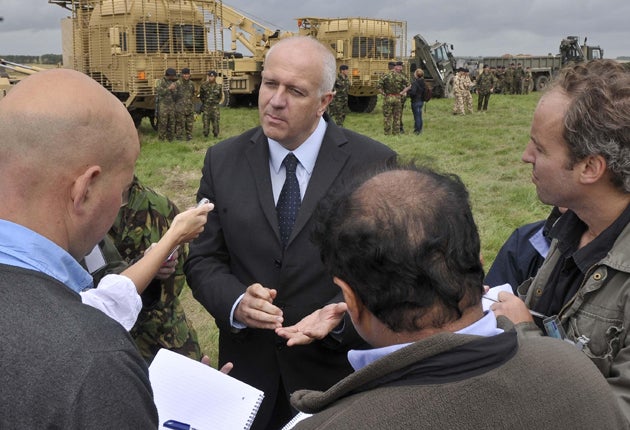Afghan war tied to security at home
Minister will emphasise battle for hearts and minds as reinforcements prepared

Your support helps us to tell the story
From reproductive rights to climate change to Big Tech, The Independent is on the ground when the story is developing. Whether it's investigating the financials of Elon Musk's pro-Trump PAC or producing our latest documentary, 'The A Word', which shines a light on the American women fighting for reproductive rights, we know how important it is to parse out the facts from the messaging.
At such a critical moment in US history, we need reporters on the ground. Your donation allows us to keep sending journalists to speak to both sides of the story.
The Independent is trusted by Americans across the entire political spectrum. And unlike many other quality news outlets, we choose not to lock Americans out of our reporting and analysis with paywalls. We believe quality journalism should be available to everyone, paid for by those who can afford it.
Your support makes all the difference.The Government is due to define its policy on the Afghan conflict in a keynote speech today, emphasising a focus on counter-terrorism while at the same time doing more to reach out to the Muslim community.
Bill Rammell, the Minister for the armed forces, will say that Islamist terrorists are to mainstream Islam what the Ku Klux Klan is to Christianity. He will also declare that there are clear indications that a failure to combat the Taliban on the front line in Asia will lead to attacks in the streets of Britain.
The Ministry of Defence's policy statement comes as accusations and recriminations over the conflict continue to mount. A report released at the weekend by the Commons' Foreign Affairs Committee criticised the Government for "mission drift", claiming the UK had been aiming for too many objectives in Afghanistan, ranging from eradicating poppies to good governance.
The Labour-dominated committee said: "The UK deployment to Helmand was been undermined by unrealistic planning at senior levels, poor co-ordination between Whitehall departments and, crucially, a failure to provide the military with clear direction." The committee demanded that the Government should urgently issue a statement setting out what lessons have been learned from "the mistakes made by the international community over the last seven years".
"During our visit we were struck by the sheer magnitude of the task confronting the UK," the committee said. "We conclude that there has been significant 'mission creep' in the British deployment to Afghanistan, and that this has resulted in the British government being now committed to a wide range of objectives."
The Independent has learned that Mr Rammell will say in an address to the Royal United Services Institute today: "Contributing to national and international efforts to counter terrorism is one of the MoD's highest priorities." These efforts are "focussed on overseas operations to counter the international terrorist threat before it reaches the UK."
He will say that "Our Armed Forces are in Afghanistan defending our national security. They are fighting an insurgency which, if successful, would provide free reign to the terrorist capacity that inspired, planned and provided support for attacks like those of 9/11 – of 7/7... We must continue to grow and adapt our counter-terrorism strategy to address terrorism's new face."
The Minister will stress that Britain and the West must engage with the Muslim community both at home and abroad. "The majority of Muslims stand against this violent extremism. Many of the victims to date of the terror and injustice it wreaks have been Muslims.
"Violent extremist views are shocking to the overwhelming majority of Muslims, in the same way that Christians are shocked by the views of the Ku Klux Klan. This is not democracy versus Islam; democracy and Islam are not mutually exclusive. This is not a clash of civilisations – this is a clash for civilisation, a struggle for the soul of the 21st century." Countering radicalism, he will say, involves "reaching out to those in our society who are being specifically targeted by al-Qa'ida and others".
The new American commander of Nato forces in Afghanistan, General Stanley McChrystal, is expected to set out his blueprint for the Afghan campaign later this week. He is expected to say that Western forces must work and live among the people, and that much greater efforts will be made to avoid civilian casualties in airstrikes.
*51 British soldiers have had amputations after being wounded on duty in Afghanistan, a Ministry of Defence (MoD) spokesman said. The official figure released by the MoD does not cover the past few months which have seen heavy casualties among British troops.
The MoD spokesman said: "As of 31 March, 2009, a total of 51 UK service personnel have suffered amputations due to injuries sustained while on operational deployment on Operation Herrick."
Join our commenting forum
Join thought-provoking conversations, follow other Independent readers and see their replies
Comments